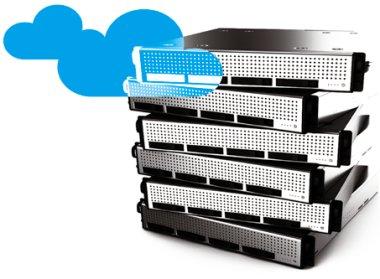Technology -- Out of the Ether
By Rob Churcher
Nagano-based server company JMF is using cloud computing to provide cheap, eco-friendly solutions to clients

It’s a simple and yet complex concept - a virtual server. The idea of pulling out the clunky piece of hardware that is at the heart of a business’ information processing system and surrendering it to the ether can be a difficult proposition for some business owners. “Cloud computing” is becoming more of a buzz word as Internet infrastructure rapidly improves around the globe and desktop and mobile devices increasingly piggyback processing power that exists elsewhere. In Japan, a paradox exists where although the country has some of the best infrastructure in the world, in application development and conceptual usage, it lags. Superfast optic fiber networks mean that users can enjoy high-speed download and upload time, and yet business owners can be slow in taking advantage. But things are changing.
In a time when the terms “green” and “technology” are thrown about as businesses make their pitches, it can be rare when the two combine to form a combination where they make real economic sense when it comes to the bottom line and at the same time improve efficiency. Virtualization does both, says Jason Frisch from JMF, a rapidly expanding Nagano-based virtual server provider. JMF’s virtual server company, Tsukaeru, is now finding that more companies are switching to virtual servers to reduce costs and, in the process, become more eco-friendly. “It’s a lot greener than dedicated servers—about 10 to 20 percent of a dedicated server is utilized, the rest is literally the servers producing hot air.” While dedicated servers chew through a certain amount of electricity, virtual private servers (VPS) can allocate space to cope with added processing needs while reducing space when the workload decreases. The company is also now able to switch companies between their servers, with zero downtime, when it is called for. The consolidation of server space means reduced cooling costs as well. Electricity is saved, efficiency is maximized and for the fraction of the cost of a dedicated server. “It’s a lot greener than dedicated servers—about 10 to 20 percent of a dedicated server is utilized, the rest is literally the servers producing hot air,” says Frisch. “Virtualization is more flexible, more reliable and a heck of a lot cheaper.”
Frisch says that one of his machines is able to host up to 30 virtual servers meaning that efficiency is maximized, and electricity and space are saved.
 Jason Frisch
Jason Frisch
While some business owners in Japan have been slow to switch to VPS, things are starting to evolve. For Tsukaeru, its customer base is now rapidly expanding. The company, which currently employs 18 staff, has about 12,000 customers—and the number continues to grow. The company is completely automated and so can set up accounts in about five minutes without so much as a keypad being touched. Customers set up their servers via the Internet and as soon as payment is finalized, the server is right to go.
“It has to be automated, everything has to be automated or we won’t do it,” says Frisch.
As a result the company is able to set up an exponential number of virtual servers only restricted by the power of its hardware, which can easily expand depending on the foreseen demand. At present, JMF has about 40 to 50 new customers signing up each day. Without the hassle of staff having to fax or email customers, the process is taken care of by the computers themselves. Meanwhile, staff are on hand to provide support for customers.
Frisch, who has been working in IT in Japan for years, has seen the industry evolve during his time here. He originally worked in the finance industry as an FX options expert at Fenics before moving to Citibank where he developed its fund manager system. He went on to work on the merger of the Industrial Bank of Japan, Fuji Bank and Dai-Ichi Kangyo Bank to create Mizuho Bank.  One of Tsukaeru.net’s www.tsukaeru.net machines can hold up to 30 virtual servers. Frisch helped merge the banks’ FX trading systems, before moving back to his native Australia in 2002 for two years to start his own business, reselling servers from the United States to Japanese customers. In 2004 he relocated to Nagano where he started JMF (the company took his initials for its name) the umbrella company that operates his virtual server company—Tsukaeru. Although he hadn’t worked in virtualization before, he had started a side business, hosting server space in 1999.
One of Tsukaeru.net’s www.tsukaeru.net machines can hold up to 30 virtual servers. Frisch helped merge the banks’ FX trading systems, before moving back to his native Australia in 2002 for two years to start his own business, reselling servers from the United States to Japanese customers. In 2004 he relocated to Nagano where he started JMF (the company took his initials for its name) the umbrella company that operates his virtual server company—Tsukaeru. Although he hadn’t worked in virtualization before, he had started a side business, hosting server space in 1999.
When he came back to Japan, Frisch took note of what was going on overseas and saw that most of the hosting was not being done within the major cities. In Nagano, Frisch was able to keep space costs and staffing costs down and was also able to take advantage of the natural cooling that the area provides.
“The only thing we had to pay more for was the connectivity,” he says.
And for Frisch, the choice is paying dividends—the pace of the company’s expansion continues.
“We’ve had 100 percent growth for four years and we plan to IPO in three years,” he says.
Now the company is looking to the future. With an increasing focus on green technology and the bottom line more important than ever, virtual servers are becoming a much easier sell within Japan. As more business owners come to terms with the technology and more IT managers allow their carefully-guarded server room space to be handed over to other departments, VPS are becoming more common. As more companies make the switch Tsukaeru is there to provide the service, and, for the young company, the ether is the limit. JI
A Virtual Private Server is a method of partitioning a physical server computer into several individual servers in a way that gives each the appearance and capabilities of a server running on its own dedicated machine. Each virtual server can run its own operating system, and each server can be independently rebooted.





